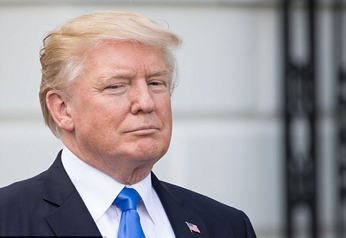WASHINGTON, March 3, 2018 (BSS/AFP) – US President Donald Trump on Friday welcomed the prospect of a trade war, remaining defiant in the face of the global uproar sparked by his sudden announcement of steel and aluminum tariffs.
With global stock markets tumbling and allies riled, the president greeted the negative reaction by raising the stakes and vowing even harsher trade policies.
In a blistering series of morning tweets, he said he would seek to impose “reciprocal taxes” on all imports from trading partners that charge duties on American exports.
That would ratchet up the administration’s confrontational “America First” trade policy far beyond the hefty steel and aluminum tariffs he announced Thursday — which come despite strenuous objections from stunned advisors and powerful industry groups.
The wide-ranging actions, if imposed, would eviscerate the rules-based global trading system the US helped to build, and drastically raise the chances of a trade war.
But in an early morning tweet Trump seemed to welcome the prospect, saying “trade wars are good, and easy to win.”
– ‘Reciprocal taxes’ –
Allowing imports into the US market duty free when similar exports face tariffs is “not fair or smart,” Trump said on Twitter.
“We will soon be starting RECIPROCAL TAXES so that we will charge the same thing as they charge us. $800 Billion Trade Deficit-have no choice!”
He also defended his decision Thursday to impose 25 percent tariffs on steel imports and 10 percent on aluminum.
“IF YOU DON’T HAVE STEEL, YOU DON’T HAVE A COUNTRY!” Trump said in another tweet Friday.
And while some allies, like Canada, had hoped to be spared the tariffs, a senior administration official said Friday that Trump had ruled out allowing countries to be exempted, which could inflame tensions even further.
Already on a shaky footing, Wall Street stocks split on Friday, with the Dow closing down 0.3 percent but the Nasdaq up one percent after investors came in looking for technology bargains.
Officials were caught flat-footed by Trump’s announcement Thursday, and the White House had not even completed a legal review of the proposed tariffs, officials told AFP.
Economists say tariffs such as those Trump proposes will hurt the US companies and workers he has said he wants to protect. The US is the world’s largest steel importer and the move could jack up costs for crucial inputs for infrastructure and industries that are major employers.
– ‘Biggest policy blunder’ –
An editorial in the conservative Wall Street Journal typified the dismay of industry advocates, calling the tariffs the “biggest policy blunder” of Trump’s young presidency and “self-inflicted folly.”
Commerce Secretary Wilbur Ross leapt to the president’s defense, holding up cans of Budweiser, Coca-Cola and Campbell’s Chicken Noodle soup during an appearance on CNBC and arguing that ordinary consumer goods would see little increase in price.
But Sherrie Rosenblatt, vice president and spokeswoman for the Can Manufacturers Institute, told AFP the value of metal in an individual item did not reflect the true burden tariffs would create for can manufacturers and users.
Trump’s most frequent whipping post on trade, China, called on the US to exercise “restraint,” warning that the tariffs could prompt reprisals and have “a serious impact” on the global trade order.
The European Commission vowed to “react firmly” while Canada and Germany each called the tariffs “unacceptable,” with Germany urging Trump to reconsider.
– Helping a few, hurting many? –
“When you have the president of the United States going on the record and saying trade wars are good and they’re easy to win, I shudder to think what that even means,” Rufus Yerxa, president of the National Foreign Trade Council, told AFP.
Trump’s decision could hit other countries far more than China, which is the world’s largest steel producer but accounts for less than one percent of US imports.
Major players in the US metals industry and their workers, who have long complained of dumping, overcapacity and subsidies by competing producers, would be the obvious beneficiaries.
But analysts say a far larger share of US industry and economic activity would be exposed to higher prices, weighing on growth and employment.
Recent official figures show about 140,000 Americans work in US steel mills, generating about $36 billion in economic activity, or about 0.2 percent of GDP. But steel-consuming industries employ 6.5 million Americans and add about $1 trillion to GDP.
In 2002, then-President George W. Bush imposed steel tariffs that caused an estimated 200,000 in job losses and cost nearly $4 billion in lost wages. The administration backtracked a less than two years later after it lost a dispute before the World Trade Organization.



